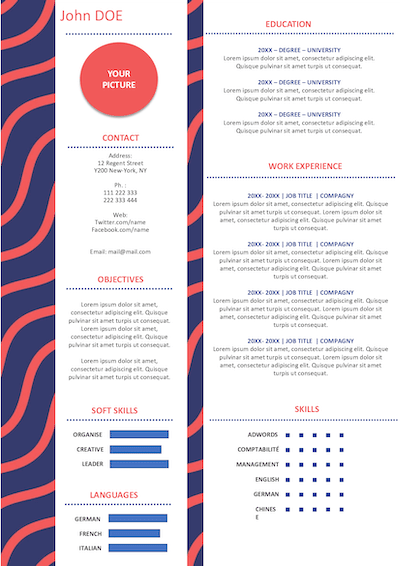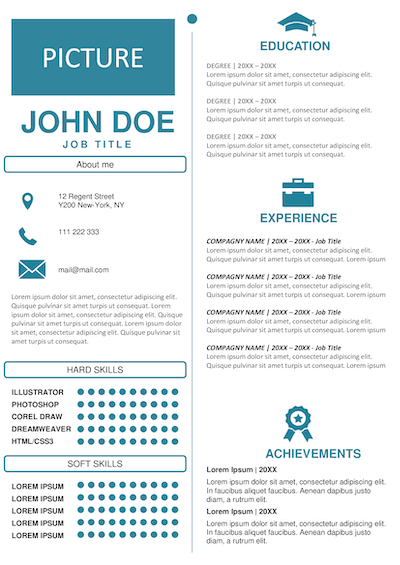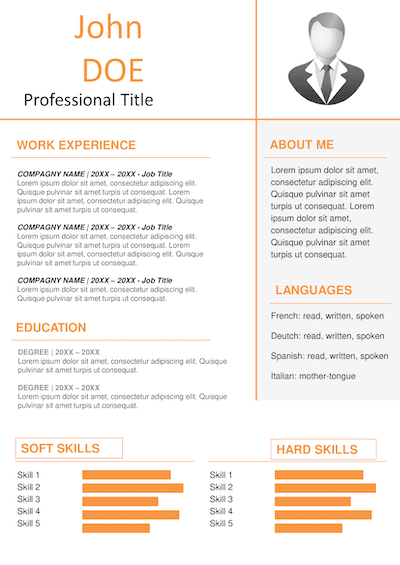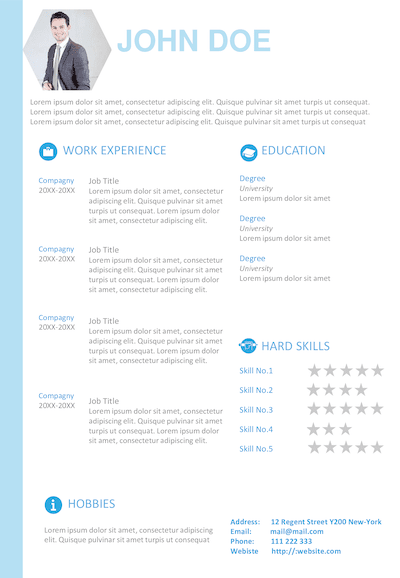How to Write A Cover Letter ?
Writing a letter is not as easy as you think. Apart from style and formatting, you must first learn about the company and meet the needs of the job (experience, skills) outlined in the job offer. Here are our tips for writing an effective cover letter.
How to prepare a first-class cover letter
Before you start writing a cover letter, you should already have a resume that matches the description of the job you are applying for. The resume will help you think your letter more clearly and keep your objective in view. This being said, the cover letter is as important as and sometimes even more important than your resume. Unlike the resume which can sometimes be impersonal, the cover letter will provide the first direct contact between you and the recruiter. You will disclose facets of your personality through your choice of words and phrasing which is why special care must be brought to the writing of such a letter.
It is a lot easier to write a good cover letter if you know exactly what kind of job you are applying for and in what type of business. The more you know about the job and its environment, the better the letter will be. This does not mean that you should content yourself with a laudatory speech on the firm but rather try to focus on what makes you so perfect for this particular firm in this particular position.
You should also try to use the name of the person who will read you. A letter that is addressed to the employer specifically will be more likely to attract his attention. Do not hesitate to contact the company in person or by phone to find out the name of this person. This will only show greater motivation and knowledge of recruiting procedures. (See section in resume writing for “how to prepare a good resume”)
The layout of a cover letter
The general layout of a cover letter is very formal. Observe the following format carefully. But also pay attention to your choice of words for each one of them may be very significant. In this section, you will also find suggestions for phrasing.
General layout
Your letter should be about a page long, never any longer.
Your address should figure at the top left-hand corner, with the date a few lines underneath, followed by the name of the contact person - or if it cannot be avoided, “To whom it may concern” or “Dear Sir/Madam”. Next, we find the body of the letter in 3 or 4 paragraphs. Finally, write a polite closing and your signature at the bottom. Add your name above your signature if you think it is not legible enough.
A good introduction
Your first words will be decisive. Try to catch the attention of the reader without forgetting the formalities of speech. Here are a few examples of catch phrases to begin your letter.
“I recently spoke to Mr X, the sales manager from your firm Z and he strongly recommended that I send you a copy of my resume. Knowing the requirements for the position, he felt that I would be an ideal candidate”.
“Your ad n°000 has piqued my interest. This position has had strong appeal to me since me ...”
“Recently, I have come across an advertisement for a position as a Word Processing Trainer in your firm. My candidacy for this position is advanced by my experience in three areas: training, support, and a technological background”.
If you are merely inquiring about job openings in the company, try to be specific about your prospective job and ambitions. State why your attention has been drawn to this particular business.
Use paragraphs
The body of the letter should contain 3 or 4 paragraphs corresponding to :
1- What job you are applying for.
2- Why you are interested in this job, this company and how your interests match those of the company.
3- How your personal skills, knowledge and experience can contribute to the growth of the company.
4- Your willingness to attend an interview and how and when you will keep in touch with them.
A good conclusion
Your last words are also of primordial importance. They should leave an impression of assertiveness, confidence and enthusiasm.
Do not say “I look forward to hearing from you”, but rather use one of the following phrasings:
“I am available for an interview to discuss my qualifications at your earliest convenience. I can be reached at ... I would like to thank you in advance for your time and consideration and look forward to meeting with you”.
“I am looking forward to meeting with you, Mr X, and I will call you within a week to follow-up on this letter.” “Please find enclosed a copy of my resume for your review. I believe the combination of my ... education and my business experience offers me the unique opportunity to make a positive contribution to your firm.”
Conclude with "Yours sincerely” if you have addressed the letter to a person by name, or use the formal "Yours faithfully" or "Best Regards" if you have used a "Dear Sir/ Madam" greeting.
The contents of a cover letter
The cover letter must persuade the recruiter to read your resume. To do so, you must be inventive and inviting while still observing the regular rules of form and content. These are the items that will necessarily appear in your cover letter.
The reasons why you want the job
You may want a job only because it pays well but even so, think about, for instance, the challenges it could involve and enhance upon them. It is not prohibited to mention the expected wage in your cover letter but you should use extra care in doing so. Since you are still in the process of selection, you are not in a position that allows you to impose any conditions. However, if the salary is of primordial importance to you, you may use this kind of phrasing:
“Although I am far more interested in a fine company and an intriguing challenge than merely in the money, you should know that in recent years my compensation has been in the range of $... to $.... “
“A salary of $... would be acceptable, however, my main concern is to find employment where there is potential for growth.”
Other reasons can be the company’s leading position in some specific field, the geographical location of the job, the job’s particularities, the work environment, the business trips implied and so on.
Your experience, qualifications
If you are answering an ad, pick up the information specifically requested for the position and adapt your profile accordingly. If some elements of relevance were left out in your resume, put them forward now in the cover letter. Otherwise, highlight the relevant details of experience and education using power verbs and phrases. (See section on Power verbs in the Resume writing rundown)
Your personality type
Do not go into detail too much as sometimes it is better not to announce certain qualities in a cover letter. Only what is professionally relevant should figure in the letter. Here are some qualities that will look good and that are, most of the time, professionally accepted: hardworking, team worker, dynamic, take initiative, show intelligence, stability, maturity, managing skills, leading skills, motivated, professional, knowledgeable...
The structure of your letter
Introduction
This is your one and only chance to name drop, so take advantage of it. Potential employers want to know how you heard about the position. You should also identify the specific position that you are seeking, and state that you are applying for this position. Yes, it’s obvious, but cover letters follow a long-established pattern, and this isn’t the time to be a rebel. Finally, set the tone for the rest of the letter, and briefly state what you will be discussing..
Employment Paragraph
If you have more than a few years of experience in the field to which you are applying, your professional experience should be presented before your educational experience. First, write a topic sentence that presents one unified idea. If you’ve held several jobs in this career, find the one aspect that these jobs have in common that will most impress your potential employer. You also need to link this paragraph to your educational experience.
Education Paragraph
Similar to your employment paragraph, you need to develop one unified idea rather than simply presenting a list of all the schools you’ve attended and courses you’ve taken. Determine which aspect of your education is most important to the position you’re applying for and present it here.
Optional Paragraph
A fourth and even fifth paragraph may be added if you need to present additional relevant information. Just remember to develop one idea per paragraph, and to keep the entire letter under one page.
Conclusion
This is your opportunity to tie everything together, leading the reader to invite you to an interview. You need to reference your resume and any other included attachments. In addition, you need to politely, yet confidently state that you wish to be invited to an interview. Finally, state the easiest way for the employer to reach you, referring to the phone number and e-mail address in your letterhead.
Editing and Proofreading
For important documents like cover letters, you need to go beyond your computer’s spell check and grammar check. Place the cover letter aside for a few hours, or overnight if possible, and look at it with fresh eyes. You might find errors that you didn’t see previously. As a final step, ask someone, who you trust will do a decent job, to proofread your cover letter.
Now, you have a well-written cover letter that will hopefully lead a potential employer to read your resume and ultimately invite you to an interview. The rest is up to you!
More guidelines on how to write a cover letter
You might be sure that you are perfect for the position you are applying for but this does not mean that your cover letter is the best. Please follow this advice closely, these are a few things that you must absolutely do.
Use power phrases
Do not forget to be convincing, assertive and dynamic in your writing. Here are some examples of sentences that show these qualities, you may adapt them to your own situation.
“I am confident that with my abilities I can make an immediate and valuable contribution to ...”
“I feel confident that an interview would demonstrate that my expertise in setting up rep organizations, and training and managing an international sales department would be an excellent addition to your growing ... company”.
“I am accustomed to a fast-paced environment where deadlines are priority and handling multiple tasks simultaneously is the norm. I enjoy a challenge and work hard to achieve my goals. Constant negotiations with all levels of management and union employees have strengthened my interpersonal skills. I would like very much to discuss with you how I could contribute to your organization”.
“My personal goal is simple: I wish to be part of an organization that works to excel in both ... and ... I believe that if I had the opportunity to interview with you it would be apparent that my skills are far reaching”.
Script
It can be nice to have the fonts match between the resume and the cover letter. Times New Roman, Courier, Helvetica, New Century, Palatino or Arial are the most common scripts because they are clear and legible. Font sizes from 10-12 are used mostly and are also more legible. It is also recommended to use broad margins. The reader will be interested if the layout is clear and light.
Proofread
Ask someone competent to read your resume and correct your typing, spelling and grammatical mistakes.



